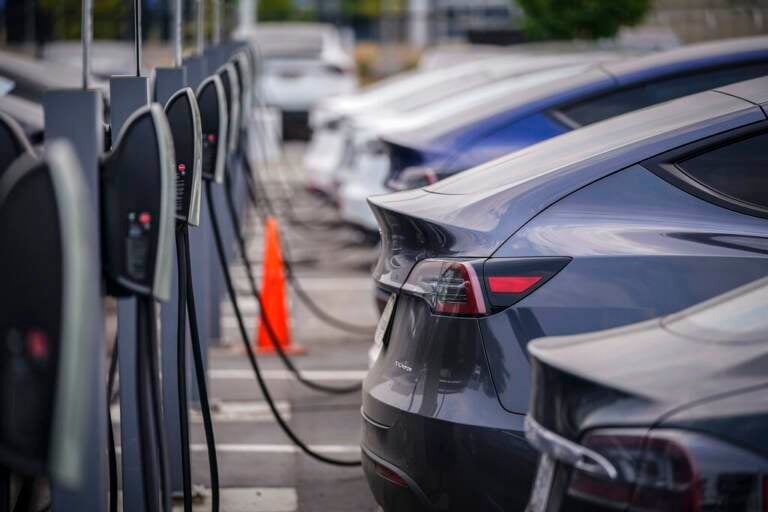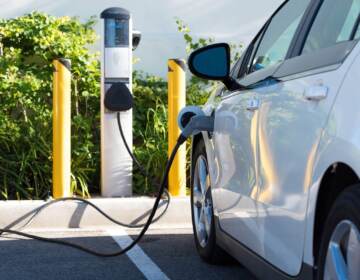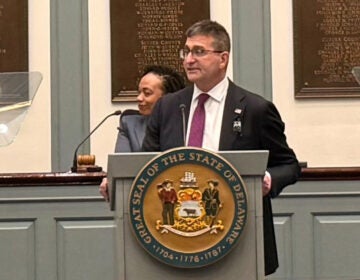‘Nobody voted this guy in’: Delaware GOP seeks to strip environmental chief of power to mandate electric vehicles by 2035
Republican lawmakers want to put the authority in the hands of the General Assembly. They have drafted but not introduced legislation to accomplish that.

File photo: A group of cars line up at charging stations at a dealership in Littleton, Colo. (AP Photo/David Zalubowski)
While Delaware Environmental Secretary Shawn Garvin mulls whether to implement his agency’s proposed mandate that all new cars delivered to dealerships by 2035 are electric, Republican lawmakers are eyeing legislative ways to strip him of that power.
Two bills that have been drafted but not yet introduced would eliminate the ability of the Department of Natural Resources and Environmental Control to independently adopt any regulations aimed at restricting the sale of gas-powered cars, trucks, or SUVs.
The first, from House Minority Leader Michael Ramone, would require General Assembly approval for any such rules. The second, from Senate Minority Whip Brian Pettyjohn, would simply prohibit the environmental secretary from adopting any rules pertaining to the percentage of electric vs. gas-powered vehicles delivered to dealerships.
The issue began percolating last year after Democratic Gov. John Carney announced that Delaware would adopt the Advanced Clean Car II rule as part of Delaware’s regulations under the federal Clean Air Act.
Under the proposal, starting in 2026, 35% of newly manufactured vehicles delivered to Delaware would have to be electric. That figure would gradually increase until it hits 100% in 2035.
The rule has been adopted by 14 other states, including Delaware neighbors New Jersey and Maryland. Pennsylvania has not done so.
Under Delaware law, the environmental secretary has the power to adopt the rule but only after publishing the proposal, seeking public comment, and holding a public hearing. Other agencies have similar authority to promulgate rules and policies to comply with state or federal laws.
But in a series of town halls GOP lawmakers held last month, many attendees complained that an unelected bureaucrat like Garvin could decide what kind of car they could buy. One woman noted that “nobody voted this guy in’’ and suggested he had a “God complex.’’
Garvin, who attended some hearings, told skeptical listeners he had not made up his mind, but also said people could still buy used gas-powered cars in 2035, or even new ones from previous model years.
There’s no guarantee that the GOP proposals will be submitted to fellow lawmakers for their consideration, however. While Pettyjohn and Ramone have drafted the bills, they haven’t introduced them for consideration yet. Instead they are being “circulated for sponsorship.’’
Their chances of passage would be steep, however. Democrats control both chambers of the General Assembly and outnumber Republicans by nearly two to one.
Pettyjohn noted, though, that the overwhelming majority of residents at the GOP’s meetings were against the rule.
“DNREC should be subservient to our citizens, not the other way around,” Pettyjohn said in a news release. “I do not think there is much liberty or independence in a mandate that is coming from an unelected body here in Delaware, the Department of Natural Resources, pretty much telling people that you have to buy a certain vehicle, even if it does not fit their needs.”
Ramone, who represents the Pike Creek area of northern New Castle County, said “the regulations DNREC is proposing would eliminate our citizens’ ability to choose. It’s a terrible slippery slope. I just don’t think the people in my district and our state are ready for this type of zealous overreach.”
Garvin and Carney did not comment on the GOP’s legislative proposal. But Emily Hershman, Carney’s spokesperson, said the state’s process is proper and lawful.
“Under the federal Clean Air Act, state regulations are where vehicle emission requirements and fuel efficiency standards have been set for decades — in Delaware and in every other state,’’ Hershman said in a statement.
“The proposed gradual increase over the next 12 years in electric vehicle delivery requirements is a way to reduce one of the largest sources of air pollution, and the state regulatory process is where vehicle emissions have always been addressed in a process that requires and encourages public input.”
Democratic state Rep. Paul Baumbach of Newark, who supports adopting the rule, agreed, saying the state has put the power in the executive branch.
“They’re the ones who set regulations,” Baumbach said. “They have to go through the Administrative Procedures Act to make sure they’ve got their open meetings. They take all the comments, they review them all, they use the best science and make their decisions.”
“It may not appeal to a minority party who doesn’t view things the way the majority of the state residents do, and that’s certainly their right.”

Get daily updates from WHYY News!
WHYY is your source for fact-based, in-depth journalism and information. As a nonprofit organization, we rely on financial support from readers like you. Please give today.







